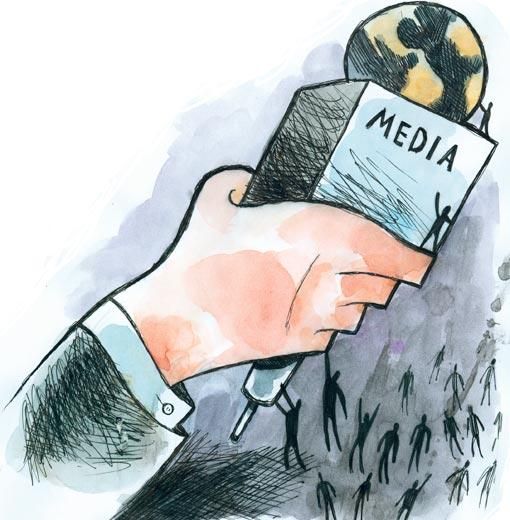Something ominous was happening last week and it was not in Gaza. As Israel's Operation Hot Winter was unfolding in the beleaguered Strip, the international media was looking the other way.
The downplay by the big news organisations was too conspicuous to be a coincidence. As Israeli jets and tanks pounded the heavily populated Jabaliya refugee camp in what was dubbed a major operation even by Ehud Barak's standards, international media downgraded the news to the bottom of their bulletins. It was a despicable exercise of editorial judgment.
The fact that most casualties were civilians and that roughly a third of the dead were children failed to excite the likes of CNN, BBC and leading western newspapers.
There was a conspiracy of silence to bury the story and to give Israel ample time to carry out its operation with minimum public opinion interference.
But mostly the mainstream media had presented itself as a weapon of mass distraction. It was shocking that the malaise had infected many Arab news outlets. The Arab street, not to mention governments, was slow to react as well.
Whoever controls the media makes the news. Thus when Al Jazeera was deploying all of its resources to maintain live coverage of the on-going carnage, CNN and BBC were interrupting their programmes to report the arrival of Prince Harry, hailed as the Royal soldier, at a British airbase upon his return from Afghanistan. News bulletins featured the Russian elections, Iraq and Pakistan before moving on to the events in Gaza.
Sound bites
CNN did not bother to send a reporter to the Strip and was happy to quiz its correspondents in occupied Jerusalem on the latest developments. It was all about sound bites; Israel determined to stop the firing of Hamas missiles into civilian areas and claims by the Palestinians that most of the dead were civilians including children.
There was no footage to accompany the initial reports, and when BBC and CNN finally aired some, they showed nothing of the bloodbath that was taking place.
It was a disgrace not because as Arabs we saw evidence of bias and collusion, but because it was simply unprofessional. Gaza was a big story and it will remain so for weeks. The assets that the likes of CNN and BBC and others have dedicated to this story were non-existent.
And aside from Al Jazeera, which has a number of correspondents and stringers in the Strip, the rest of the Arab media relied almost exclusively on wire service feed.
There is a message in all this. The illusion of a free and responsible media has been crushed. Almost every major news organisation, TV, newspaper and news portal claims to adhere to a strict code of ethics, most of which are published on their websites. The Gaza fiasco proved that few take these codes seriously.
Grey area
The newsroom is politicised and few viewers realise that beyond the promises of objectivity, fairness and freedom there is a grey area where editors express their own political beliefs and bend the rules to fit a certain agenda.
A few years ago the editors of big news organisations such as The New York Times and CNN apologised informally to a group of Arab journalists over their coverage of the Iraq invasion and the diplomatic battle that preceded it.
They admitted that they were duped by the Bush administration propaganda machine over the presence of irrefutable evidence incriminating Iraq of possessing weapons of mass destruction, which eventually led to war.
That was over four years ago, but since then western media have failed to bring themselves back into a credible zone, especially when covering issues relating to the Arab-Israeli conflict and the Palestinian debacle. While such discrepancies have been exposed on numerous occasions, the fact remains that coverage of the Israel-Palestine conflict remains skewed.
There are exceptions, and the bold reporting of the likes of Robert Fisk and Seymour Hersh of issues troubling our region espouses the fact that independent media exist in the US and Europe and that while some in the mainstream may have lost their bearing, there are others who still believe in a journalistic code of ethics that transcends narrow political agendas.
Media shapes public opinion and that is why it must remain free from the influence of politicians and conglomerates. The Gaza episode has uncovered deep flaws in media treatment of controversial issues. But it also underlined the crisis that now hits mainstream news organisations. It is true that such big media outlets continue to be influential players in the public domain, but by the same token they must realise that they are not alone.
There are hundreds of websites that provide a different perspective and offer an alternative. While their effect at this stage is limited, they stand to gain a lot if the major players continue to put their credibility on the line.
Osama Al Sharif is a veteran publisher and journalist based in Jordan.









